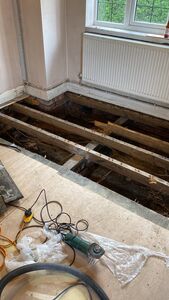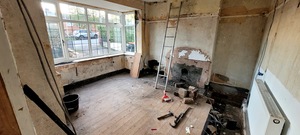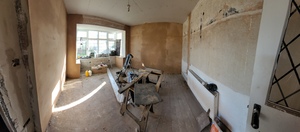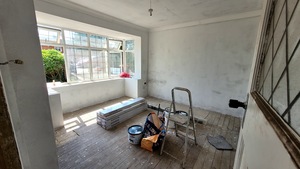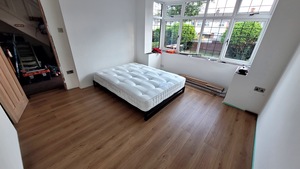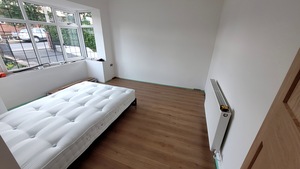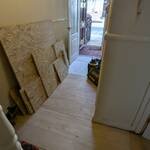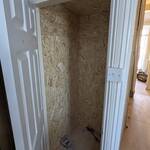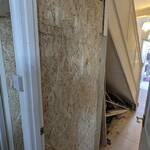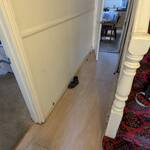Uneven or sloping floor?
Cause: Over time, structural settling, shifting foundations, or worn-out joists can cause floors to sag or slope.
What to Look For: You might notice furniture not sitting level, or you can feel it when you walk across the room.
Why It Matters: Could be cosmetic—or a sign of deeper structural problems, especially if it’s getting worse.
Creaking or Squeaky Floors
Cause: Loose floorboards, shrunken wood from years of temperature and moisture changes, or nails popping up.
What to Look For: Sounds when you walk in certain spots, especially near high-traffic areas.
Fix: Can usually be fixed by re-securing boards or adding screws from below, if accessible.
Rotting or Soft Spots
Cause: Moisture infiltration—common in bathrooms, kitchens, or near exterior walls.
What to Look For: A spongy feeling underfoot, discoloration, musty smells.
Danger: Rotting subfloors can collapse if not addressed—especially hazardous in high-traffic or load-bearing areas.
Pest Damage
Cause: Rodents can chew through subflooring or joists.
What to Look For: Hollow sounding wood, small holes, fine sawdust, or droppings.
Remedy: Pest inspection and replacement of damaged wood can be expensive if it’s widespread.
Insufficient Support or Overspanning
Cause: Older buildings might not meet modern span/load standards. Joists may be too far apart or undersized.
What to Look For: Bounciness or flex when walking.
Fix: Reinforce with sistering joists, adding support beams, or shortening the span.
Previous Repairs or DIY Jobs
Cause: Homeowners or handymen doing patchwork repairs without addressing root issues.
What to Look For: Mismatched materials, uneven transitions, patchy or loose areas.
Fix: Might need to pull up and redo sections of floor correctly.
In older buildings, the flooring might look fine on the surface but hide problems underneath.
A full inspection from above and below (in a crawl space or basement) is key. If you’re renovating, it’s often smart to open things up and reinforce or replace what’s needed while you have access.
Let me know what kind of floor you’re dealing with—wood, tile, concrete, etc.—and I can give you more targeted advice.
Floor repair and installation
Repair of water damaged subfloor (damp) and laminate floor installation.
Subfloor replacement
After inspection of small area of sagging floor i have found out that floor joists are rotten in other areas. Also i have found some woodworm damage to the pantry.
Customer after our conversation deciced to replace whole subfloor and update with OSB boards to prevent further damage.

